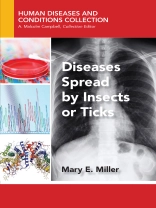Vector borne diseases transmitted through ticks and mosquitos cause serious loss of life and significantly impact human populations worldwide. Each of these diseases is caused by a distinct pathogen, and symptoms vary depending on the type and severity of infection. The spread of these diseases occur through the blood meals of tick or mosquitos, where the pathogen gains access to the human body, usually triggering an immune response that contributes to disease progression. Understanding the interdependence of pathogen to disease vector along with transmission route to humans shapes our diagnosis and treatment of these diseases. This book focuses on five distinct examples of vector borne disease: Malaria, West Nile, Lyme disease, dengue fever, and bubonic plaque. Malaria involves the mosquito vector and occurs when mosquito transmit the Plasmodium parasite to humans. West Nile and dengue fever also involve different mosquito vectors, but in this case transmission of the West Nile virus or dengue fever virus cause disease. Fleas transmit the bubonic plague causing bacterium Y. pestis. Lyme disease results from the transmission of the bacteria Borrelia burgdorferi to humans through the bit of a tick. In each case we consider current and future issues related to disease progression, diagnosis, and treatments.
Sobre el autor
Mary Elizabeth Miller is a professor of biology at Rhodes College, TN where she teaches introductory biology, genetics, molecular biology, microbiology, and topical seminars on cancer. Dr. Miller has an active research program where she studies cell division and key regulators of the cell division cycle and has been awarded the Rhodes College Clarence Day Award for Outstanding Research or Creative Activity. She received her Ph D in microbiology from the University of Virginia, Charlottesville, VA, and studied as a postdoctoral fellow at the Rockefeller University, NY. Dr. Miller is a strong advocate of implementing effective integration of research in teaching environments and strives to make strong intellectual scientific content available to the informed public.












